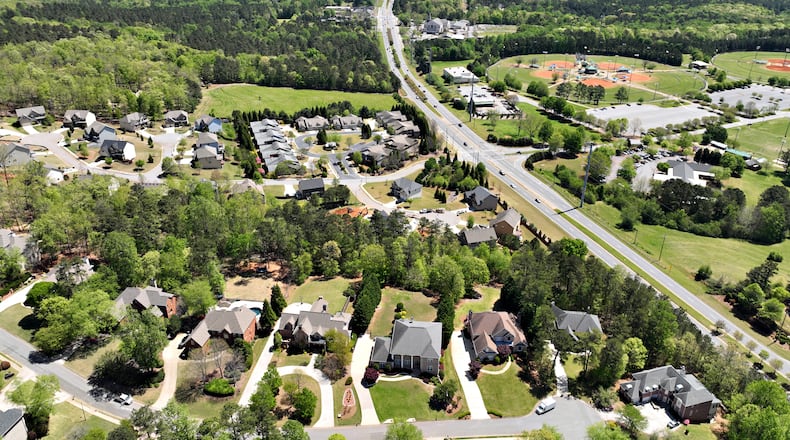When state Rep. Ginny Ehrhart explains to West Cobb voters why they should form a new city, she often tells the story of an old fire station on Mars Hill Road.
The Cobb planning board wanted to rezone the public property for commercial use, so the county could sell it. Keli Gambrill, the West Cobb district commissioner, wanted the land restricted to the lightest retail category, preventing the buyer from building a car wash or gas station behind a single-family neighborhood.
But as Ehrhart tells it, the good ol’ days when local leaders like Gambrill could guide development in the neighborhoods they represent are long gone.
“They had the votes to overrule her and to beat her,” Ehrhart, a Powder Springs Republican, said in February.
The story plays on a fear shared by many West Cobb residents as they decide whether to incorporate the city of Lost Mountain. The county they call home is changing around them, and as conservative political power wanes in the growing Atlanta suburb, many feel helpless to protect their neighborhoods from encroaching development.
Trouble is, the story is not entirely true.
Credit: Arvin Temkar/AJC
Credit: Arvin Temkar/AJC
Gambrill, a Republican, ultimately won the zoning case — a detail that Ehrhart left out when she gave her sales pitch to voters in February and again in April.
Not only did Gambrill win that fight, an AJC review of more than 200 zoning cases found that she was on the winning side of every zoning decision in her West Cobb district since Democrats took control of the board in January 2021.
The cityhood campaign run by Preserve West Cobb has repeatedly insisted that Democrats on the county commission want to bring apartments, low-income housing, industrial development and mass transit to their community. A city government accountable only to West Cobb residents, they say, is the only thing that can stop it.
The narrative employed by the campaign is not unique to Lost Mountain. In Buckhead, where a cityhood movement was shot down earlier this year by the GOP-led legislature, misleading claims were made by proponents about zoning, the rate of crime there, and Atlanta Mayor Andre Dickens’ alleged support for “defunding the police.”
Fears of urbanization are also driving two other Republican-led cityhood movements in Cobb County, those of East Cobb and Vinings. But in those communities, higher density development is already a reality, not a fiction.
By contrast, the AJC found little evidence to support the most incendiary claims of Lost Mountain supporters. Over 90% of zoning cases in the last 15 months were decided unanimously, the AJC found. And, in the 17 cases that weren’t, the commissioner whose district was affected still won every vote, regardless of their party.
As Gambrill told her constituents at a town hall earlier this month, “you do have local control within District 1.”
Credit: arvin.temkar@ajc.com
Credit: arvin.temkar@ajc.com
Pro-cityhood ‘boogeyman’
Covering most of Cobb’s unincorporated land west of Marietta and north of Powder Springs, the proposed city of Lost Mountain would provide only a handful of services, including trash collection, parks and code enforcement. Like two other Cobb cityhood movements headed to the May 24 primary ballot, the top priority for supporters is planning and zoning.
To opponents of cityhood, the main argument for a city of Lost Mountain unravels in the face of the evidence. Why should they create a city government to reclaim local control over zoning if they never lost it to begin with?
“The pro-city people have created a boogeyman with development and with the chair of our county commission (Democrat Lisa Cupid),” said Dora Locklear, the leader of West Cobb Advocate, which opposes cityhood. “I’m concerned that the truth is being misrepresented.”
Credit: HYOSUB SHIN / AJC
Credit: HYOSUB SHIN / AJC
But to cityhood supporters, just because urbanization hasn’t come to West Cobb yet, doesn’t mean it won’t.
“You could have said that in East Cobb 20 years ago: ‘That’s not going to happen here.’ But it did,” Ehrhart told the AJC. “You could’ve said that in South Cobb 25 years ago: ‘It’s not going to happen here.’ But it did. It’s happening everywhere.”
Since 1980, Cobb County has more than doubled in size, adding roughly 470,000 people. West Cobb, so far, has retained its rural-suburban mix, sustaining farmland and large residential lots alike. But elsewhere in the county, denser single-family subdivisions cover what was once empty land, while apartments and townhomes have joined what were once exclusively single-family neighborhoods.
Overall, Cobb has added about 189,000 housing units since 1980, according to U.S. Census data. But the bulk of that growth has been single-family homes, not the apartments that cityhood advocates so often reference.
Detached homes today make up 66% of Cobb’s 303,000 total housing units, about the same as their 65% share in 1980. Condos and townhomes are up from 3% to nearly 9% of the total. Proportionally, apartment units actually dropped from 27% to 23% of all homes.
It’s not clear how much responsibility either party bears for the market forces fueling the outward sprawl of metro Atlanta. But in Cobb, it has largely been Republicans at the helm. They controlled the county commission and guided its land use policies for decades.
Still, there’s no denying that Democrats are steering the county’s policies to the left.
Cobb Chairwoman Lisa Cupid, a Democrat, has been a vocal proponent of affordable housing and mass transit since she took office in January 2021. But she says she has never targeted West Cobb for development that its residents don’t want.
“I don’t know where that assertion has come from because that is not anything I have ever stated,” Cupid said. “There has not been any intentional effort around that (industrial development), nor around putting high density residential development in West Cobb.”
Credit: HYOSUB SHIN / AJC
Credit: HYOSUB SHIN / AJC
The unfounded claim that Cupid wants industrial development in West Cobb quotes an editorial she wrote as a candidate for a South Cobb district seat in 2012. But in it, she never called for industrial activity in West Cobb. She instead reflected on the tension it creates when industry is located too close to neighborhoods like her own.
In March, Cupid did make comments at her state of the county address aimed directly at cityhood advocates that oppose affordable housing.
“The concern is I am bringing affordable housing next door to you,” Cupid said. “I can tell you that if you want grocery stores next door to you, if you want schools next door to you ... affordable housing has to go somewhere.”
That somewhere is unlikely to be West Cobb.
Subsidized housing would be prohibitively expensive under the land use plan, which contemplates spacious lots, with fewer than 2 homes per acre. Federal and local affordable housing guidelines also prioritize proximity to jobs and transit — neither of which West Cobb has in abundance.
Even the most ambitious transit proposals put forth by Cobb transportation planners envision little to no coverage in West Cobb due to its lack of density.
The county zoning code prohibits industrial and high density residential development within the proposed Lost Mountain city limits, and only allows commercial development at a handful of key intersections, like the corner of Brookstone Drive and Mars Hill Road, the site of the disputed former fire station.
When zoning changes are made, commissioners are supposed to follow the county’s future land use plan, which guides development through 2040.
An AJC analysis found that the document envisions 97% of Lost Mountain’s 28,000 parcels being rural, low or very low density residential, with no multi-family housing at all, with the exception of senior living.
The reason for that isn’t just political. Much of West Cobb lacks sewer lines and other infrastructure needed to support higher density development due to the area’s difficult terrain.
“I am confident not much will change in West Cobb pertaining to infrastructure — because it cannot,” Gambrill wrote in an email to constituents earlier this month. Publicly, Gambrill and the commission as a whole have taken a neutral position on cityhood.
Credit: arvin.temkar@ajc.com
Credit: arvin.temkar@ajc.com
A misleading sales pitch
Gambrill, who is running for a second term this year, has earned a reputation among cityhood supporters and opponents alike as a defender of the West Cobb way of life. A former community advocate with People Looking After Neighborhoods, she routinely introduces developers to neighbors so disputes can be resolved before the commission is asked to vote.
Her voting record suggests her tactics are effective. She says she has allowed development that deviates from the future land use plan just once, and it was to approve a development for seniors that had the support of its neighbors.
The AJC review found only a handful of the 39 zoning cases in her district from January 2021 through March 2022 involved housing, and none featured apartments. Just two were of moderate density: the senior housing near Kennesaw, and townhomes near Marietta.
But cityhood opponents say that’s not the impression voters receive when they hear the Lost Mountain sales pitch.
“They’re being lied to,” Locklear said. “I don’t like that they’re being lied to and led to believe that an additional layer of government is necessary to prevent re-zoning.”
Credit: HYOSUB SHIN / AJC
Credit: HYOSUB SHIN / AJC
While praising Gambrill’s leadership on one hand, cityhood proponents also depict her as unable to protect West Cobb from development due to the Democratic majority. When asked about comments made to voters, Ehrhart told the AJC: “We never once said that she was outvoted. We said that there has been a concerted effort to push back on her.”
A recording available on YouTube shows otherwise.
At a Feb. 17 virtual meeting, Ehrhart told the crowd: “The only person that is standing up to try to put the brakes on high density development in West Cobb is your single commissioner, and she’s outnumbered 4-1. She’s outvoted frequently.”
Cobb’s cityhood movements:
Voters in unincorporated Cobb will be asked if they want to incorporate as many as four new city governments this year. Three referendums will be decided during the May 24 primary election: the proposed cities of Lost Mountain, Vinings and East Cobb. If any is approved, voters would elect their first city officials during the Nov. 8 general election. A referendum to form the city of Mableton in South Cobb is also planned for Nov. 8.
Only those who live within the proposed city limits can vote on each referendum.
The AJC will have additional coverage educating voters on what’s at stake with each referendum as Election Day approaches. The last day to register to vote is April 25, and advanced voting begins May 2.
About the Author
Keep Reading
The Latest
Featured









